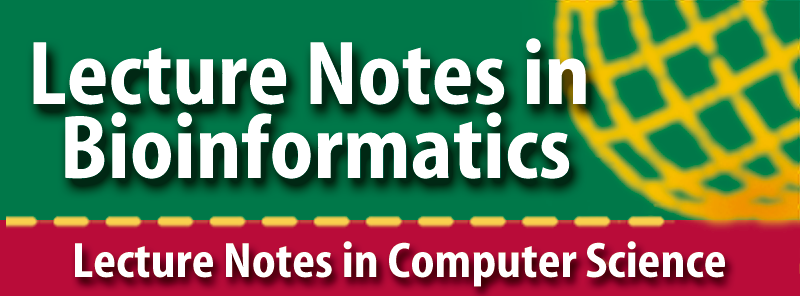Registration
Plenary Talks
| Prof. Rita Casadio |
|---|
|
Prof. Rita Casadio
Her main research interests are currently focused on computer modelling of relevant biological processes, such as protein folding and modelling, protein-protein interactions, genome annotation, protein interaction networks, or SNPs search and annotation and their effect on protein stability. One of her major fields of research is the development of specific software for problem solving of large scale analysis of biomedical and biotechnological data out of genome sequencing or experiments on proteomes and interactomes. Methods are based on neural networks, hidden Markov models, Support Vector Machines, conditional random fields and their combinations. Her researches are devoted to different aspects of protein structure prediction, including prediction of secondary and tertiary structure, membrane protein topology, protein function, protein-protein and protein-DNA interaction, protein reaction mechanisms in biological processes and de novo design of peptides/molecules (for details see http://lipid.biocomp.unibo.it). She is the author of about 300 scientific papers and presented her work at several (over 300) national and international meetings. |
| Integrative Bioinformatics supporting biomedical research |
|---|
|
Prof. Ferran Sanz
Ferran Sanz is academic coordinator of the Spanish Technology Platform on Innovative Medicines (PTEMI) and scientific director of Bioinformatics Barcelona (BIB). He also coordinates the Biomedical Informatics Node of the Spanish Institute of Bioinformatics (INB). He was president of the European Federation for Medicinal Chemistry (EFMC) from January 2003 to December 2005 and vice-rector for Scientific Policy of the UPF from January 2004 to March 2009. |
| Dr. Andreas Bender |
|---|
|
Dr. Andreas Bender
Before assuming faculty positions, Andreas was a Presidential Postdoctoral Fellow with the Novartis Institutes for BioMedical Research in Cambridge/MA and the Broad Institute of Harvard and MIT, working on projects related to ligand-based drug design in Novartis' Lead Discovery Informatics group. His work comprised applications to predict biological targets for small molecules and approaches to chart chemical space and the relations among targets, based on the similarities of their ligands.Andreas received his PhD from the University of Cambridge (UK) developing virtual screening methods working with Prof. Robert C. Glen at the Centre for Molecular Informatics. He was a Cambridge Gates Scholar and a member of Darwin College whilst at Cambridge and did his undergraduate studies in Berlin, Dublin and Frankfurt as a German National Merit Foundation scholar. Andreas currently has more than 70 publications in the cheminformatics and bioinformatics fields to his credit and besides being a referee for more than 20 journals he serves on the editorial board of Combinatorial Chemistry and High-Throughput Screening (CCHTS). Personal Website (including list of publications): http://www.andreasbender.de This information is from: Andreas Bender |
-
Full contributions in IWBBIO 2016 will be published in Lecture Notes in Bioinformatics

-
Full contributions in IWBBIO 2016 available on-line in Lecture Notes in Bioinformatics

- Program IWBBIO 2016 program is already available.
-
Plenary Talk:
Prof. Rita Casadio
Group leader of the Bologna Biocomputing Unit University of Bologna (UNIBO), Bologna (Italy)
-
Plenary Talk:
Prof. Ferran Sanz
Director, Research Programme on Biomedical Informatics (GRIB) Hospital del Mar Medical Research Institute (IMIM) Dept. of Health and Life Sciences, Universitat Pompeu Fabra
-
Plenary Talk:
Prof. Andreas Bender
Department of Chemistry. Centre for Molecular Informatics. Group Leader: Bender Group. University of Cambridge.
- Online Registration The registration platform is open !
Tweets from @iwbbio15









 1
1 2
2 3
3 4
4 5
5 6
6 7
7 8
8 9
9 Rita Casadio obtained her degree in Physics at the University of Bologna (Italy). She attended several courses both in Italy and
abroad and acquired experience and theoretical background in different fields, such as Computer Science, Membrane and Protein Biophysics, Bioenergetics and Irreversible Thermodynamics.
Rita Casadio obtained her degree in Physics at the University of Bologna (Italy). She attended several courses both in Italy and
abroad and acquired experience and theoretical background in different fields, such as Computer Science, Membrane and Protein Biophysics, Bioenergetics and Irreversible Thermodynamics.
 Ferran Sanz is chemical engineer by the Institut Quimic de Sarria (Barcelona) and BSc and PhD by the Universitat Autonoma de Barcelona. Currently, he is full professor of Biostatistics and Biomedical Informatics at the Universitat
Pompeu Fabra (UPF, Barcelona) and director of the IMIM-UPF joint Research Programme on Biomedical Informatics (GRIB). He has been visiting professor at Federico II (Naples), Dusseldorf and Vienna Universities.
Ferran Sanz is chemical engineer by the Institut Quimic de Sarria (Barcelona) and BSc and PhD by the Universitat Autonoma de Barcelona. Currently, he is full professor of Biostatistics and Biomedical Informatics at the Universitat
Pompeu Fabra (UPF, Barcelona) and director of the IMIM-UPF joint Research Programme on Biomedical Informatics (GRIB). He has been visiting professor at Federico II (Naples), Dusseldorf and Vienna Universities.
 Andreas Bender is a Lecturer for Molecular Informatics with the Centre for Molecular Informatics at the University of Cambridge. Until April 2010 he was an Assistant Professor for Cheminformatics and Pharmaceutical IT with the Leiden / Amsterdam Center for Drug Research and Head of the Pharma-IT Platform at Leiden University. In his work, he is involved with the analysis of various kinds of bioactivity data and the generation of property prediction models, mainly for small molecules..
Andreas Bender is a Lecturer for Molecular Informatics with the Centre for Molecular Informatics at the University of Cambridge. Until April 2010 he was an Assistant Professor for Cheminformatics and Pharmaceutical IT with the Leiden / Amsterdam Center for Drug Research and Head of the Pharma-IT Platform at Leiden University. In his work, he is involved with the analysis of various kinds of bioactivity data and the generation of property prediction models, mainly for small molecules..